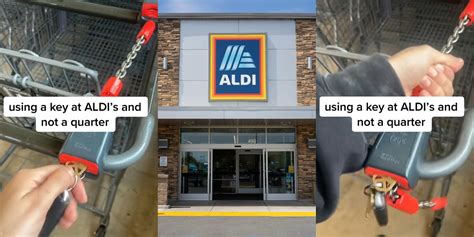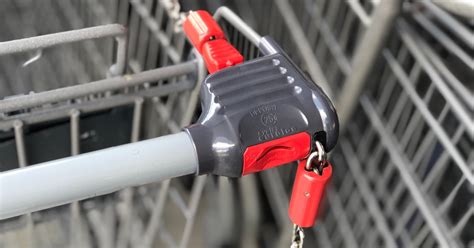
A viral TikTok hack demonstrating how to unlock an Aldi shopping cart without a quarter is gaining traction, prompting both praise for its ingenuity and warnings about potential risks. The hack involves using a key or similar rounded object to temporarily release the cart’s locking mechanism, circumventing the need for the required 25-cent deposit. While proponents see it as a convenient solution, critics raise concerns about potential damage to the carts and the erosion of Aldi’s system designed to ensure cart return.
Aldi Shopping Cart Hack Goes Viral: Is it Clever or Careless?
A seemingly innocuous TikTok video showcasing a workaround for Aldi’s shopping cart quarter deposit system has ignited a debate online, questioning the ethics and potential consequences of the popular hack. The viral trend demonstrates how to unlock an Aldi shopping cart without inserting a quarter, utilizing a common household item like a key, or even a specific type of screwdriver. While some applaud the resourcefulness of the hack, others express concern about the potential damage to the carts, the integrity of Aldi’s established system, and the potential for increased cart abandonment.
The hack, widely circulated on social media platforms like TikTok and YouTube, typically involves inserting a rounded metal object, similar in size and shape to a quarter, into the cart’s coin slot. The demonstrator in the original viral video successfully used a standard key, inserting it into the slot and wiggling it slightly to release the locking mechanism. The video, viewed millions of times, has spawned numerous imitations, with users experimenting with various objects to replicate the result. The appeal of the hack lies in its simplicity and the promise of avoiding the minor inconvenience of needing a quarter to access a shopping cart.
Aldi’s shopping cart system, which requires a 25-cent deposit to unlock a cart, is a deliberate strategy employed by the grocery chain to minimize cart theft and ensure that customers return the carts to their designated corrals. This system reduces the need for employees to constantly retrieve carts from the parking lot, freeing them up for other tasks and contributing to the company’s overall operational efficiency. The deposit system also encourages responsible behavior from shoppers, as they are incentivized to return the cart to retrieve their quarter.
The rise of the viral hack presents several potential challenges to Aldi’s carefully designed system. Firstly, widespread adoption of the hack could lead to an increase in cart damage. Users experimenting with different objects to unlock the carts may inadvertently damage the locking mechanism, rendering the carts unusable. Secondly, the hack could contribute to a rise in cart abandonment. If customers can easily obtain a cart without a deposit, they may be less inclined to return it, leading to carts being left in parking lots, streets, or even taken off the premises entirely. This not only creates a nuisance for Aldi and its customers but also poses a potential safety hazard.
Aldi has not yet issued an official statement regarding the viral hack. However, anecdotal reports suggest that some Aldi employees are aware of the trend and are taking steps to mitigate its potential impact. These measures may include increased monitoring of the cart corrals, more frequent cart retrieval by employees, and potentially, modifications to the cart locking mechanism to make it more resistant to unauthorized manipulation.
The debate surrounding the Aldi shopping cart hack highlights the complex interplay between consumer ingenuity, corporate strategies, and the potential unintended consequences of viral trends. While the hack may seem like a harmless shortcut to some, it raises important questions about respecting company policies, the potential for property damage, and the broader implications of circumventing established systems.
Expert Opinions and Potential Ramifications
Consumer behavior experts weigh in on the psychological factors driving the popularity of the Aldi shopping cart hack. Dr. Emily Carter, a professor of marketing at the University of California, Berkeley, suggests that the hack taps into a sense of cleverness and resourcefulness. “There’s a certain satisfaction that comes from finding a loophole or a workaround, especially when it involves a seemingly minor inconvenience like needing a quarter,” Dr. Carter explains. “It’s a form of perceived ‘winning’ against a system, even if the stakes are incredibly low.”
She also notes that the virality of the hack is fueled by social media’s inherent reward system. “Sharing these types of ‘life hacks’ online generates social currency. People want to be seen as knowledgeable and helpful, and posting a successful hack can earn them likes, shares, and positive comments.”
However, Dr. Carter cautions that this pursuit of social validation can sometimes overshadow ethical considerations. “The focus shifts from whether the hack is actually beneficial or harmless to simply gaining attention and recognition. This can lead to a disregard for the potential negative consequences, such as damage to property or undermining established business practices.”
Legal experts also offer their perspectives on the legality of the Aldi shopping cart hack. While it is unlikely that using a key to unlock a shopping cart would result in criminal charges, legal analysts emphasize that intentionally damaging the cart or permanently altering the locking mechanism could constitute vandalism or property damage, which are punishable offenses.
“The key issue is intent,” explains attorney David Miller, a partner at a law firm specializing in property law. “If someone is simply using a key to temporarily release the lock and returns the cart afterward, it’s unlikely to be considered a crime. However, if they deliberately break the lock or cause significant damage to the cart, they could face legal repercussions.”
Miller also points out that Aldi could potentially pursue civil action against individuals who are found to be intentionally damaging their property. “Aldi has a right to protect its assets, and if they can prove that someone’s actions have resulted in financial losses, they could sue for damages.”
Beyond the legal and ethical considerations, the Aldi shopping cart hack also raises questions about the long-term sustainability of Aldi’s business model. The company’s ability to offer low prices is predicated on operational efficiency, which includes minimizing losses from cart theft and abandonment. If the hack becomes widespread and leads to a significant increase in these losses, Aldi may be forced to raise prices or implement more stringent security measures, ultimately impacting consumers.
Alternative Solutions and Responsible Shopping Practices
As the debate surrounding the Aldi shopping cart hack continues, alternative solutions and responsible shopping practices are gaining attention. Some shoppers are advocating for the use of reusable shopping cart tokens, which are small, quarter-sized metal or plastic discs that can be used to unlock Aldi shopping carts and then easily retrieved. These tokens offer a convenient and environmentally friendly alternative to carrying around loose change.
Several online retailers and craftspeople offer a variety of shopping cart tokens, ranging from simple designs to personalized versions with initials or logos. These tokens are readily available and relatively inexpensive, making them an accessible option for frequent Aldi shoppers.
Another approach is to simply be prepared with a quarter when shopping at Aldi. Keeping a quarter in a designated spot in a wallet or car can eliminate the need to resort to hacks or other workarounds. This simple step can help ensure a smooth and hassle-free shopping experience.
Furthermore, promoting responsible shopping practices, such as returning carts to their designated corrals and avoiding any actions that could damage the carts, can help preserve the integrity of Aldi’s system and ensure that the company can continue to offer low prices and efficient service.
Examining the Broader Context of “Life Hacks”
The Aldi shopping cart hack is just one example of a broader trend of “life hacks” that have become increasingly popular in recent years. These hacks, which range from simple tips and tricks to elaborate DIY projects, are designed to make everyday life easier, more efficient, or more affordable.
The appeal of life hacks lies in their ability to empower individuals to take control of their environment and solve problems creatively. They offer a sense of agency and resourcefulness, allowing people to find innovative solutions to common challenges.
However, the proliferation of life hacks also raises concerns about the potential for misinformation, unsafe practices, and the erosion of ethical boundaries. Not all life hacks are created equal, and some may be based on inaccurate information or promote behaviors that are harmful or unethical.
It is important to approach life hacks with a critical and discerning eye, evaluating their validity, safety, and ethical implications before adopting them. Consulting with experts, researching the source of the hack, and considering the potential consequences are essential steps in ensuring that life hacks are used responsibly and effectively.
The Aldi shopping cart hack serves as a microcosm of these broader issues, highlighting the tension between individual ingenuity, corporate interests, and the potential for unintended consequences. As consumers navigate the ever-evolving landscape of life hacks, it is crucial to prioritize responsible behavior, ethical considerations, and a respect for established systems.
The Future of Aldi’s Shopping Cart System
The popularity of the Aldi shopping cart hack may prompt the grocery chain to re-evaluate its current system and consider potential modifications to enhance its security and prevent unauthorized manipulation.
One option could be to implement a more sophisticated locking mechanism that is more difficult to bypass with common household objects. This could involve using a different type of coin slot, adding additional security features, or even incorporating electronic locking technology.
Another possibility is to increase the amount of the deposit required to unlock a cart. A higher deposit could deter some individuals from attempting to circumvent the system and potentially reduce cart abandonment.
Aldi could also explore alternative cart management systems, such as those used by other grocery chains. These systems may involve using GPS tracking technology to monitor cart locations, implementing stricter penalties for cart theft, or even eliminating the need for a deposit altogether.
Ultimately, the decision of how to respond to the Aldi shopping cart hack will depend on a variety of factors, including the cost of implementing new systems, the potential impact on customer convenience, and the overall effectiveness of the chosen solution.
Regardless of the approach Aldi takes, it is clear that the viral hack has raised awareness of the vulnerabilities of the current system and prompted a discussion about the importance of responsible shopping practices.
The incident also highlights the power of social media to influence consumer behavior and the challenges that businesses face in adapting to rapidly evolving trends. As technology continues to advance and new forms of social interaction emerge, businesses must remain vigilant in monitoring online discussions and proactively addressing potential threats to their operations.
The Importance of Ethical Considerations
Beyond the practical considerations of cart management and security, the Aldi shopping cart hack also raises important ethical questions about respecting company policies and avoiding actions that could harm businesses.
While some may argue that circumventing the quarter deposit system is a harmless act, others contend that it undermines the principles of fair exchange and ethical behavior. Aldi has implemented the deposit system to protect its assets and ensure efficient operations, and intentionally bypassing this system can be seen as a form of disrespect or even theft.
The incident also highlights the importance of considering the potential consequences of one’s actions, even when those actions seem trivial or inconsequential. The Aldi shopping cart hack may seem like a minor transgression, but if it becomes widespread, it could lead to significant financial losses for the company and ultimately impact consumers.
Furthermore, the hack raises questions about the role of social media in promoting unethical behavior. The viral nature of the hack has normalized the act of circumventing the quarter deposit system, potentially encouraging others to engage in similar behaviors.
It is essential for individuals to consider the ethical implications of their actions, both online and offline, and to avoid engaging in behaviors that could harm businesses or undermine established systems. Promoting responsible and ethical behavior is crucial for maintaining a fair and sustainable economy.
Conclusion: A Moment of Reflection
The Aldi shopping cart hack, while seemingly trivial on the surface, serves as a valuable case study in the complexities of consumer behavior, corporate strategies, and the ever-evolving landscape of social media. It highlights the tension between individual ingenuity, the pursuit of convenience, and the importance of ethical considerations.
The incident underscores the need for businesses to remain vigilant in monitoring online discussions and proactively addressing potential threats to their operations. It also emphasizes the importance of promoting responsible shopping practices and encouraging consumers to consider the potential consequences of their actions.
Ultimately, the Aldi shopping cart hack should serve as a moment of reflection for both businesses and consumers, prompting a deeper examination of the values and principles that guide our interactions in the marketplace. By prioritizing ethical behavior, respecting established systems, and considering the potential impact of our actions, we can create a more fair, sustainable, and responsible economy for all. The conversation should continue to address how technology intersects with everyday routines, business practice, and individual ethics within a digitally connected society.
Frequently Asked Questions (FAQ)
1. What is the Aldi shopping cart hack and how does it work?
The Aldi shopping cart hack refers to a method of unlocking an Aldi shopping cart without using a quarter. It typically involves inserting a rounded metal object, such as a key or a specific type of screwdriver, into the coin slot and manipulating it to release the locking mechanism. The exact method can vary, but the general principle is to mimic the size and shape of a quarter to trick the system.
2. Is the Aldi shopping cart hack illegal?
Using a key or similar object to temporarily release the lock on an Aldi shopping cart is unlikely to result in criminal charges. However, intentionally damaging the cart or permanently altering the locking mechanism could constitute vandalism or property damage, which are punishable offenses. Aldi could also potentially pursue civil action against individuals who are found to be intentionally damaging their property.
3. What are the potential consequences of using the Aldi shopping cart hack?
The potential consequences of using the Aldi shopping cart hack include:
- Damage to the cart’s locking mechanism, rendering it unusable.
- An increase in cart abandonment, leading to carts being left in parking lots or taken off the premises.
- Potential legal repercussions if the cart is intentionally damaged.
- A negative impact on Aldi’s operational efficiency and potentially higher prices for consumers.
4. What are some alternative solutions to using the Aldi shopping cart hack?
Alternative solutions to using the Aldi shopping cart hack include:
- Using reusable shopping cart tokens, which are small, quarter-sized discs that can be used to unlock Aldi shopping carts.
- Being prepared with a quarter when shopping at Aldi.
- Promoting responsible shopping practices, such as returning carts to their designated corrals and avoiding any actions that could damage the carts.
5. What is Aldi’s official stance on the shopping cart hack?
As of the current information available, Aldi has not issued an official statement regarding the viral hack. However, anecdotal reports suggest that some Aldi employees are aware of the trend and are taking steps to mitigate its potential impact, such as increased monitoring of the cart corrals and more frequent cart retrieval. Aldi’s official response will likely depend on the prevalence of the hack and its overall impact on the company’s operations.









